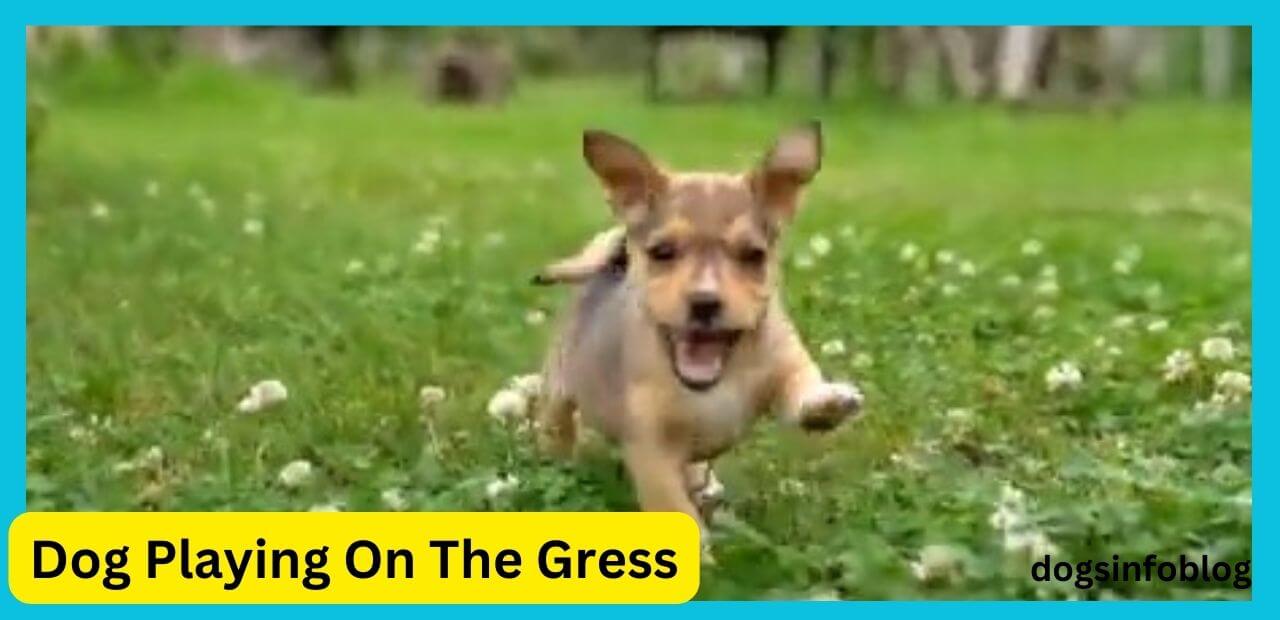Hi dog lover, do you have any ideas on Why Does My Dog Pull Up Grass When Playing? So let’s start discover the reason.
When playing, your dog may pull up grass due to instinctual behaviors or to release pent-up energy. This behavior is common in dogs and can be attributed to their natural instincts, such as hunting and digging.
It’s essential to provide alternative outlets for their energy, such as interactive toys or engaging in physical activities, to redirect their behavior.
Additionally, regular exercise and mental stimulation can help reduce their urge to pull up grass. By understanding and addressing the underlying reasons for this behavior, you can create a more fulfilling and engaging environment for your furry friend.
Understanding The Behavior
When playing, dogs may pull up grass due to their natural instincts and behaviors. This behavior can be a form of play or exploration, or they may simply be seeking attention from their owners. Understanding their behavior can help address any concerns or redirect their activities appropriately.
The Significance Of Play In A Dog’s Life
Dogs, like humans, have a natural inclination towards play. Play is an essential part of their lives and contributes to their overall well-being. It helps them exercise, expend energy, and promotes mental stimulation. When dogs engage in play, it helps them build social bonds, develop problem-solving skills, and reduces stress and anxiety.
However, certain behaviors during play, like pulling up grass, might leave dog owners puzzled. Let’s explore some common reasons why dogs engage in grass-pulling during play.
Common Reasons Why Dogs Engage In Grass-Pulling During Play
- Exploration: Dogs are naturally curious creatures, and during play, they use their senses to explore the environment. Pulling up grass allows them to discover new scents, textures, and even hidden treasures like bugs or critters.
- Release of energy: Dogs may resort to grass-pulling as a way to release excess physical energy. As they engage in energetic play, they might feel the need to channel their excitement into an activity, and pulling up grass can provide a satisfying outlet.
- Boredom: Sometimes, dogs engage in grass-pulling during play simply because they are bored. If they lack mental stimulation or engaging toys, they might resort to exploring the surrounding area, including the grass.
- Attention-seeking: Dogs are social animals who crave attention and interaction with their human companions. Pulling up grass during play can be their way of seeking attention and enticing their owners to join in the fun.
The Role Of Instinct And Ancestral Behavior
In addition to these common reasons, dogs’ grass-pulling behavior can also be attributed to their instincts and ancestral behavior. Here are some points to consider:
- Hunting and prey-drive instincts: Dogs are descendants of wolves, and their prey-drive instincts may still be present to some extent. When dogs engage in grass-pulling, it can mimic the behavior of digging or catching prey, satisfying their natural instincts.
- Territorial marking: Dogs have a keen sense of scent, and grass-pulling can be a way for them to mark their territory. By leaving their scent on the grass, they are communicating with other dogs and establishing their presence.
- Cooling down: Dogs might pull up grass during play as a way to cool down. Grass provides a cool surface for them to lie on or rub against, helping regulate their body temperature during energetic activities.
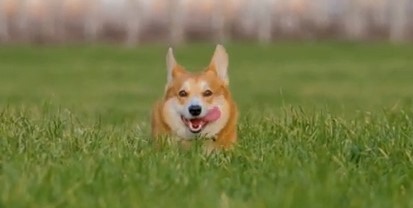
Examining the connection between grass and play behavior allows us to better understand our furry friends. While grass-pulling during play might seem perplexing, it is often a result of natural instincts, exploration, energy release, or attention-seeking behavior.
As responsible pet owners, it’s important to provide our dogs with engaging toys, regular exercise, and mental stimulation to keep them happy and curb any excessive or destructive grass-pulling behaviors.
Psychological And Physical Factors
Dogs may pull up grass during play due to a combination of psychological and physical factors. These can include instinctual behavior, the desire to seek stimulation, or even just a mischievous habit. Understanding these factors can help owners address the behavior appropriately.
The Psychological Motivation Behind Grass-Pulling
- Dogs may exhibit the behavior of pulling up grass during play due to various psychological factors. Understanding these motivations can help us address and manage this behavior effectively. Here are some key points to consider:
- Boredom and lack of stimulation: Dogs that are bored or lacking mental stimulation may resort to grass-pulling as a way to entertain themselves. It provides a sensory experience and engages them in an activity. This behavior can be seen in dogs who don’t have enough outlets for their energy or mental stimulation.
- Natural foraging instincts: Dogs have innate foraging instincts that drive them to explore and search for food or objects in their environment. Grass-pulling can be a manifestation of this instinct. It mimics the act of foraging or hunting and can provide a sense of satisfaction to dogs.
- Potential link with anxiety: Anxiety and stress can also play a role in grass-pulling behavior. Dogs may engage in this behavior as a way to self-soothe or cope with their anxiety. It can help distract them from their worries and provide a sense of comfort.
The Impact Of Boredom And Lack Of Stimulation
- Lack of mental stimulation: Dogs need mental stimulation to keep them engaged and satisfied. When they don’t have enough mental enrichment, they may resort to grass-pulling as a form of entertainment. Providing them with interactive toys, puzzle games, and training sessions can help alleviate their boredom and reduce the likelihood of this behavior.
- Insufficient physical exercise: Along with mental stimulation, dogs require regular physical exercise to burn off excess energy. If they aren’t getting enough exercise, they may seek alternative ways to release their energy, such as pulling up grass. Ensuring they have adequate opportunities for exercise and playtime can help reduce this behavior.
The Influence Of Natural Foraging Instincts
- Innate foraging instincts: Dogs have natural foraging instincts that are deeply rooted in their DNA. These instincts drive them to explore and search for food or objects in their surroundings. This behavior may have evolutionary benefits, as it allows dogs to find sources of sustenance in the wild. Grass-pulling can be a way for dogs to fulfill this instinctual drive.
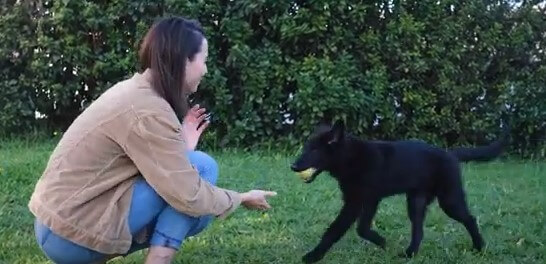
- Satisfying the need to explore: By pulling up grass, dogs engage in a behavior that simulates the act of foraging or hunting. It provides them with a sense of purpose and fulfillment. Providing alternative outlets for their instinctual needs, such as puzzle toys or hiding treats around the house, can help redirect their focus and reduce grass-pulling.
The Potential Link Between Anxiety And Grass-Pulling
- Coping mechanism for anxiety: Dogs that experience anxiety or stress may resort to grass-pulling as a way to self-soothe. Engaging in this behavior can provide them with a distraction from their anxious thoughts and help them feel more in control. It’s important to identify and address the underlying causes of anxiety in dogs to help alleviate this behavior.
- Addressing the root cause: If anxiety is the driving factor behind grass-pulling, it’s crucial to implement strategies to manage and reduce anxiety levels. This can involve techniques such as gradual desensitization, positive reinforcement training, and providing a safe and secure environment for the dog. Consulting with a professional dog trainer or behaviorist may be beneficial in developing a tailored plan for your furry friend
Remember, understanding the psychological and physical factors that contribute to grass-pulling behavior in dogs can help us implement appropriate strategies to manage and redirect this behavior effectively.
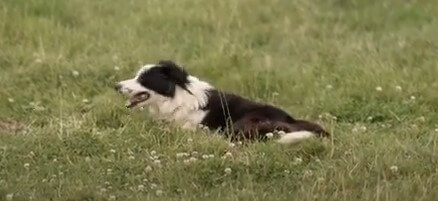
By providing mental and physical stimulation, addressing potential sources of anxiety, and considering their natural instincts, we can help our canine companions find healthier outlets for their energy and curiosity.
The Role Of Environment And Socialization
Environment and socialization play a crucial role in understanding why your dog pulls up grass when playing. Factors such as curiosity, boredom, or mimicking natural instincts may contribute to this behavior. It is essential to provide mental stimulation and proper training to redirect their attention.
Dogs are social creatures that are greatly influenced by their environment and socialization experiences. Understanding how these factors affect a dog’s play behavior can help pet owners provide the right environment and interactions for their furry friends.
In this section, we will explore the impact of the environment, socialization experiences, pack dynamics, and observing other dogs on a dog’s play behavior.
How The Environment Affects A Dog’s Play Behavior:
- Dogs are influenced by their surroundings when it comes to their play behavior. Here are some ways the environment can affect them:
- Availability of space and resources: Dogs might be more likely to pull up grass when playing if they have limited space or access to toys. This natural behavior allows them to release their energy and engage in their natural instincts.
- Sensory stimulation: Different environments provide different sensory experiences for dogs. Being in a stimulating environment with various smells, textures, and sights can trigger behaviors like grass pulling during play.
- Familiarity with the surroundings: Dogs tend to feel more comfortable and at ease when playing in familiar environments. Familiarity reduces stress and can discourage certain behaviors like grass pulling.
The Impact Of A Dog’s Socialization Experiences:
- A dog’s socialization experiences can shape their play behavior and interactions with their environment. Consider the following:
- Early socialization: Dogs that have been properly socialized in their early stages of life are more likely to exhibit positive play behavior. They are accustomed to various situations, people, and other animals, which can reduce anxious or inappropriate behaviors like excessive grass pulling.
- Lack of socialization: Dogs that have not been adequately socialized may exhibit fear or anxiety when faced with unfamiliar situations, which can impact their play behavior negatively. Pulling up grass might be a way for them to cope with their stress or feel more secure.
Exploring The Role Of Pack Dynamics And Hierarchy:
- Dogs have a natural instinct to establish a hierarchy and follow pack dynamics. Here’s how these factors influence their play behavior:
- Alpha dog behavior: The role of alpha dogs in a pack is to lead and establish dominance. Some dogs may exhibit grass pulling behavior as a way to assert their dominance or claim ownership of the territory.
- Submissive behavior: Dogs lower in the pack hierarchy might engage in grass pulling during play as a submissive gesture towards dominant dogs. It can be an attempt to appease or demonstrate their lower status within the group.
- Play signals and communication: Pack dynamics also influence how dogs communicate during play. Dogs might use grass pulling as a way to initiate or respond to play signals from other dogs, indicating their willingness to engage in social interactions.
The Effect Of Observing And Learning From Other Dogs:
- Dogs are highly observant and can learn from each other’s behaviors, including during play. Here’s how this observational learning impacts their play behavior:
- Mimicking behavior: Dogs often imitate behaviors they observe in other dogs. If a dog sees another dog pulling up grass during play, they may also start doing the same, even if they don’t fully understand the reason behind it.
- Learning through social play: Dogs learn important social skills and acceptable behaviors through play with other dogs. By observing how other dogs interact with their environment, including grass pulling, they may incorporate those behaviors into their own play repertoire.
Understanding the role of environment and socialization is key to deciphering why dogs pull up grass when playing.
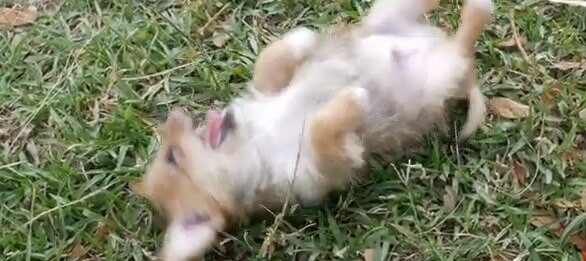
By providing a suitable environment, ensuring proper socialization, and recognizing the influence of pack dynamics and observational learning, pet owners can help their furry friends engage in healthy and fulfilling play experiences.
Health Considerations
When dogs play, they may pull up grass due to various health considerations. It could be due to boredom, curiosity, dietary deficiencies, or an instinctual behavior. It’s essential to observe and understand your dog’s behavior to ensure their overall well-being.
Assessing If Grass-Pulling Is Linked To Health Issues
- Dogs pull up grass for various reasons, and one common concern is whether it indicates an underlying health problem. Here are some aspects to consider when assessing if grass-pulling is linked to health issues:
- Observe your dog’s behavior: Pay attention to other signs of discomfort or unusual behavior that may accompany grass-pulling. This can help gauge if there are any underlying health issues causing this behavior.
- Consult your veterinarian: If you’re concerned about your dog’s grass-pulling habits, it’s always best to seek professional advice. A veterinarian can conduct a thorough examination and provide further insight into any potential health conditions.
- Evaluate overall well-being: Consider your dog’s overall health, including their diet, exercise routine, and any recent changes in behavior. A holistic approach to assessing their well-being can help identify any health-related factors contributing to grass-pulling.
Potential Digestive Concerns Associated With Grass Ingestion
- While grass-pulling itself may not be harmful, some dogs may ingest grass in the process. This can lead to potential digestive concerns. Here are a few points to keep in mind:
- Natural behavior: Dogs commonly eat grass as it may serve as a natural remedy for digestive issues or as a means of obtaining certain nutrients. However, excessive grass consumption may cause digestive upset.
- Inducing vomiting: Dogs sometimes eat grass to induce vomiting, especially when they have an upset stomach. However, it is advisable to consult your veterinarian if your dog repeatedly exhibits this behavior.
- Possible hazards: Ensure the grass your dog consumes is free from pesticides, herbicides, or other harmful chemicals. These substances can pose additional risks to your dog’s digestive system.
Examining Allergies And Sensitivities As Triggers
- Allergies and sensitivities can play a role in a dog’s grass-pulling behavior. Consider the following points when examining these potential triggers:
- Environmental allergies: Dogs can develop allergies to various components of their environment, including specific types of grass and pollen. Grass-pulling may result from an allergic reaction, such as itching or discomfort.
- Food sensitivities: If your dog has food sensitivities, it may lead to digestive issues and an increased desire to consume grass as a means of self-soothing. Investigate whether specific ingredients in their diet could be contributing to this behavior.
- Skin irritations: Dogs with skin irritations or allergies may experience itching or discomfort, which can prompt them to engage in grass-pulling as a way to alleviate these symptoms.
Identifying When Grass-Pulling May Signify A Health Problem
- While grass-pulling can be a harmless behavior, it’s essential to remain watchful in case it suggests an underlying health problem. Consider the following indications:
- Persistent grass-pulling: If your dog exhibits prolonged and intense grass-pulling behavior, it may be worth investigating further to determine if there are any health-related causes at play.
- Changes in appetite or weight: Monitor your dog’s eating habits and weight. Significant changes, such as decreased appetite or unexplained weight loss, could indicate an underlying health issue that needs attention.
- Lethargy or other unusual symptoms: If your dog appears lethargic, experiences vomiting or diarrhea, or displays any other unusual symptoms alongside grass-pulling, it’s essential to consult your veterinarian promptly.
Remember, while grass-pulling is often normal dog behavior, it’s crucial to consider a holistic perspective and consult with a professional if you have any concerns regarding your dog’s health.
Managing And Redirecting The Behavior
Discover effective ways to manage and redirect your dog’s behavior when it constantly pulls up grass while playing. Gain insights and techniques to help your furry friend engage in healthier and more enjoyable playtime activities.
Why Does My Dog Pull Up Grass When Playing?
Have you ever noticed how your dog loves to pull up grass while playing? It might seem like a harmless behavior, but it can be frustrating for pet owners. In this blog post, we will explore different strategies to manage and redirect this behavior, so you and your furry friend can enjoy playtime without the grassy aftermath.
Strategies To Redirect A Dog’s Grass-Pulling Behavior:
There are several approaches you can take to redirect your dog’s grass-pulling behavior. By providing alternative outlets for play and stimulation, implementing training techniques, and seeking professional help if needed, you can effectively address this habit and channel your dog’s energy into more suitable activities.
providing alternative outlets for play and stimulation:
- Engage your dog in interactive play with a variety of toys. Puzzle toys, treat-dispensing toys, and interactive games can provide mental stimulation and distract your dog from pulling up grass.
- Organize regular playdates or trips to the dog park. Social interaction with other dogs provides an opportunity for exercise and play, reducing the urge to pull up grass.
- Increase physical exercise by taking your dog on longer walks or jogs. A tired dog is less likely to engage in unwanted behaviors such as grass-pulling.
training techniques to discourage excessive grass-pulling:
- Teach your dog alternative behaviors through positive reinforcement training. For example, when your dog starts pulling up grass, redirect their attention to a toy or command them to perform another behavior, such as sitting or fetching.
- Use deterrent sprays or foul-tasting products on the grass to discourage your dog from pulling it up. Dogs often dislike the taste or smell, deterring them from engaging in the behavior.
- Practice leash training and teach your dog to walk calmly on a loose leash. This will help control their impulse to pull and explore the grass excessively.
seeking professional help for ingrained or problematic behaviors:
- If your dog’s grass-pulling behavior persists or becomes a problem, consider seeking professional help from a certified dog trainer or animal behaviorist. They can assess the underlying cause of the behavior and provide customized training plans.
- Professional guidance is crucial when dealing with ingrained habits or if there are potential underlying issues contributing to the behavior, such as anxiety or boredom.
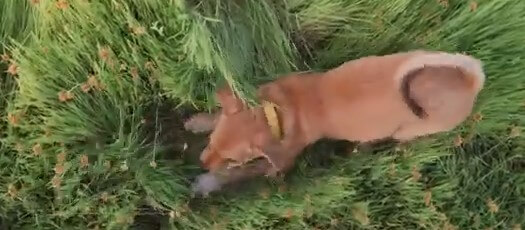
Remember, each dog is unique, and what works for one may not work for another. Be patient and consistent in your efforts to redirect your dog’s behavior, and always prioritize their physical and mental well-being. With the right strategies and guidance, you can help your dog find healthier ways to play and enjoy their time outdoors.
Frequently Asked Questions
Why Do Dogs Pull Up Grass When Playing?
Dogs pull up grass when playing due to instinctual behavior, boredom, or a natural desire to explore their environment. It can also be a form of exercise or a way to release excess energy. However, excessive grass pulling may indicate anxiety or a lack of mental and physical stimulation.
Consult with a vet if you’re concerned about your dog’s behavior.
Is It Harmful If My Dog Eats The Grass After Pulling It Up?
In most cases, if your dog eats small amounts of grass after pulling it up, it is not harmful. However, if your dog consumes large quantities of grass or shows signs of discomfort after eating it, there may be an underlying issue.
Monitor your dog’s behavior and consult with a vet if you have any concerns.
How Can I Prevent My Dog From Pulling Up Grass?
To prevent your dog from pulling up grass, provide them with ample physical and mental exercise. Engage in interactive play, use puzzle toys, and take them for regular walks. Additionally, create a designated play area for your dog with appropriate toys and positive reinforcement when they choose not to pull up grass.
Conclusion
To sum up, dogs pulling up grass while playing is a common behavior rooted in their natural instincts and behaviors. It can be attributed to a variety of factors, such as marking territory, attempting to bury or hide objects, and simply enjoying the sensory experience.
While this behavior may seem peculiar to us, it is a normal part of a dog’s play and exploration. If you are concerned about your dog’s grass-pulling habits, it is always a good idea to consult with a veterinarian to rule out any underlying issues.
Remember, providing your furry friend with ample physical and mental stimulation, along with regular walks and playtime, can help redirect their energy and provide alternatives to grass-pulling.
Ultimately, understanding and accepting your dog’s individual quirks is key to building a strong and loving bond with your four-legged companion.
visit Other Post:
Should I Give My Dog A Treat Before Bed
- Smelly House Because of Dog? Take These Hygiene Tips - May 20, 2025
- How to Introduce a Dog To a Cats Without Chaos - May 6, 2025
- 4 Best Cavapoo Rescues in the UK 2024 - April 5, 2024
